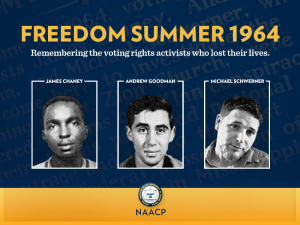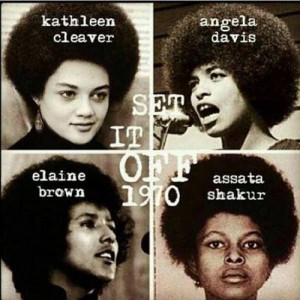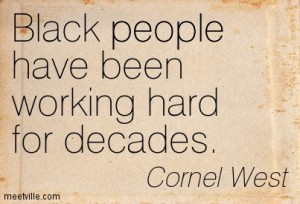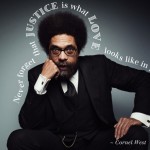While I thought week four would take longer to upload, I am determined to get this information to everyone as soon as possible! And, like last year, I did my finale separate from the final week… making a day 31 for the fireworks last day.
This weeks digest is full of very interesting studies on transgenerational trauma, historical oppression, Nina Simone, Dr. Joy Degruy, Melissa Harris-Perry, “columbusing”, some comedy, racial profiling, Freedom Summer, Angela Davis, and more. It is a power packed week of Black culture, privilege and intersectionality information and sources. And like on the other weeks, I include very personal reflections of culture as well. Enjoy and wait for the encore!
Day 23:
* This list is pretty fantastic… to the point and in plain language. It is often frustrating and disrespectful to the continued struggle of Black people to “silver line” our history or the systemic injustices that are continuing to happen today. We are in such denial in this country, we don’t want to look at the research, the studies, the legal system…. we only want to look through one set of lenses and convince ourselves that our view is the truth. As a social worker, I get the privilege of learning how to look through multiple lens…. and see how truth is not easily seen in all situations.
Racism is one of those situations. If someone is not Black or brown, they may experience challenges, prejudice, misfortune… and I validate those experiences. And yet they cannot know what racism as a Black person feels like on a visceral level. Too many white people try to intellectualize racism… and yet it is a visceral experience on a micro level… and a systemic issue on a macro level. (so is privilege)……
The generations of trauma, pain, disrupted families, loss of history, loss of culture, murder, rape, and misuse….. is only compounded and retriggered by the institutionalized and systemic racism of today.
And so we have to know some things when talking about race. And this is a good list to start with….
“Reverse racism is BS, but prejudice is not. Until people of color colonize, dominate and enslave the populations of the planet in the name of “superiority,” create standards of beauty based on their own colored definition, enact a system where only people of color benefit on a large-scale, and finally pretend like said system no longer exists, there is no such thing as reverse racism. Prejudice is in all of us, but prejudice employed as a governing structure is something different.”
http://www.thefrisky.com/2014-06-12/18-things-white-people-should-knowdo-before-discussing-racism/?mobile_redirect=false&ncid=tweetlnkushpmg00000051#!/entry/view/id/45589
* HAPPY JUNETEENTH EVERYONE!!! This is one of the most important celebraitons for Black people in this country… and really for all people. It is the day that we as a nation finally made a step forward in matching some of our behaviors with our ethics… our actions with our laws. (at least in the way of ending legalized chattel slavery).
It is one of the most important victories that we should remember and it also continues to remind us of an important lesson…… laws that are suppose to protect minorities do not always do just that. Sometimes what is on the books is not what is happening in actuality, and this is felt at a larger magnitude for people of color in this country….. that has always been the case. The gap in time when the laws of this land did not include us have still got us trailing behind in the times…. We are not there yet.
But we celebrate the victories as they come to us. Juneteenth is a huge victory and everyone should be celebrating it…. as we should celebrate every moment that brings us closer to freedom, equity, and the opportunity to have equal access to the dreams.
“Juneteenth is the oldest known celebration commemorating the ending of slavery in the United States. Dating back to 1865, it was on June 19th that the Union soldiers, led by Major General Gordon Granger, landed at Galveston, Texas with news that the war had ended and that the enslaved were now free. Note that this was two and a half years after President Lincoln’s Emancipation Proclamation – which had become official January 1, 1863. The Emancipation Proclamation had little impact on the Texans due to the minimal number of Union troops to enforce the new Executive Order. However, with the surrender of General Lee in April of 1865, and the arrival of General Granger’s regiment, the forces were finally strong enough to influence and overcome the resistance.”
http://www.juneteenth.com/history.htm
* Personal Reflections of Culture #12: Last night I sat in the Civil Rights Anniversary and listened to the historic Howard Moore Jr. speak about a lot of things… one thing really stuck out to me. He talked about how we live in this illusion… multiple illusions, and that one of them was the “N word”. That within society we have gotten this notion that someone can say “the N word” instead of the word Nigger, like it is a separate word. But his point was… there is only one word.
He talked about how racism and systems of racism against Black people were not based on a word. He said that our lives were not dependent on someone calling us a Nigger or not… Nigger was just a word…. and they still call us Niggers.
He talked about the illusion that racism is not present if someone is not using the word Nigger, from the courtrooms of our legal system, to the workplace or within society. Somehow we have (as a general society, or a white society really) put that word in context to encapsulate all of the damage of racism and if it is not used, there must be some misunderstanding.
Well, let’s look at this from a PTSD or Post traumatic slave syndrome perspective. People in the war have specific skills and levels of hypervigilance that are developed when in situations that are traumatizing. In addition complex trauma (repeated trauma situations, or multiple trauma situations) add even more layers to the trauma response. There are survival skills developed that support the person in identifying, and responding to trauma… this is a simplified version of psychology around trauma response.
What Dr. Joy Degruy (and others) were successfully able to link in data and research, was the correlations between the trauma of racism, and the responses of trauma from people who suffered other forms of trauma (like war). The symptoms play out the same, and not just with the direct trauma of racism, slavery, and the likes… but also with secondary or vicarious trauma.
And that does not even tap into the research done about trauma changing the coding in the brain and how that is genetically passed down to future generations. That research is fascinating and really incredible.
And back to my point…. we can tell when there is racism present. We are trained to be able to tell, it is a survival instinct for Black people… it is coded in our DNA just like other survival needs. We know when we are hungry, when we are sleepy, when it is time to use the restroom, and when we are in a hostile racist environment. It is like we have an automatic gauge that alerts us that it is present. And it does not hinge on the word Nigger.
There is only one word… it is not the N word, it is Nigger and it is so easy to think that if people are not saying that word anymore that we are free of the impact of racism. But that is simply wrong.
* “We’re in denial of the African holocaust,” Shabazz said. “Most times, people don’t want to talk about it. One is often restless or termed a racist just for having compassion for the African experience, for speaking truth to the trans-Atlantic and Arab slave trades, for speaking truth to the significant omission of our history. We don’t want to sit down and listen to these things, or to discuss them. But we have to.”
http://www.theguardian.com/world/2014/jun/19/malcolm-x-daughter-juneteenth-slavery-african-americans
* This is one of the most powerful things I have come across all month. She broke this down with so much skill, in 4 minutes of spoken word, that it makes my head spin…. she highlights the interchanging of language and speech within our culture… adapted for the many different aspects of who we are… and she addresses the why…. wrapped in our history.
I love this!! I am trilingual…….. THIS is a MUST WATCH. So brilliant.
http://www.ted.com/talks/jamila_lyiscott_3_ways_to_speak_english
* This is a great piece… a piece that shows the contrast of the American dream with the lack of dreams in the ghetto. I see this everyday that I go to work. The looming sadness in the depths of the inner city…. the incredible spirits of the Black and brown faces that experience so much darkness in their daily walk… that they don’t know how to dream.
This is why I do what I do, this is why I am a social worker. And the painful thing is that this is the message that we are given in society…. one that has been consistent for a couple hundred years.
“In the ghetto you live for nothing… in the ghetto you die for nothing…..cause dreams are Illegal in the Ghetto”.
https://www.youtube.com/watch?v=DKOAxg1L5HQ
Day 24:
* “When a gang member is beaten by persons unknown in a mixed neighborhood, and the black gangs begin terrorizing WHITES, it is called racism. A bunch of cops can ride through black neighborhoods all day beatin’ ass and call it law. When a bunch of Blacks beat one of these cops’ ass it’s called mob violence.” – John Africa, 1967
* Racial profiling is a terrible thing… it is one of those things that many people of color, especially Black people, have to be aware of. We, as parents, often train our kids on how to engaged with the cops when you are being pulled over, or stopped, and profiled. It is a survival lesson from parents, and a way to try and protect our kids… because when it does happen, the results can be tragic.
I posted this video last year, and yet feel it is something worth posting again, in case some people missed it. This video is pretty fascinating, about the NYPD, and the statistics of Black and brown people stopped for “looking suspicious”. And the recording of what the cops say… and the retired officer talking about cop culture as it applies to people of color…. sickening.
https://www.youtube.com/watch?v=7rWtDMPaRD8
* An incredible excerpt from Eyes on the Prize, a movie that shows some incredible… REAL footage of the Black Panthers… including them responding to the lies that they were anti-white. I have never seen this before and I am so excited to see some of the interviews and original footage from the time. From Huey P. Newton, Bobby Seale, Elaine Brown, Stokely Carmichael, to so many others…. even the footage of the panthers when they stormed the capital.
You get to hear real stuff. Not the crap that the schools tried to teach, influenced by the media campaign launched by Cointelpro…. but the real. It looks like the entire movie is on youtube in parts as well.
If you want a real reflection…. real history….. this is a good piece. And it talks about some of the exact same things that the Black community is fighting for today, freedom from police brutality, housing and food. Not much has really changed.
https://www.youtube.com/watch?v=ZMnc2KjS7Vw
* I watch this piece and I am humbled. I just saw this woman speak this week, and then I watch the part where Angela Davis is talking to the reporter, while in prison awaiting trial, about violence. Two things stick out.
#1: The reporter asks her about the use of violence in relationship to the Black Panthers and the revolution and wants to know if she condones it. She responded with a clear statement that illustrates privilege…. White Privilege…. and gives it straight to him with intelligence, tact, and gentle force.
#2: It is all right here…. in her statement, you can hear the trauma, you can hear the retelling of vicarious trauma….. the violence, the bombings, the fear…. As a social worker (or any other therapeutic interventionist) I could immediately pick out what Dr. Joy DeGruy is talking about… what other studies are showing. And a reminder, slavery is a trauma that would be transgenerational for this generation and mine but the trauma of the 50’s, 60’s, and 70’s would not be. This generation had primary trauma of that era….. following me here?
The significance of this time continued to shape Black culture, our understanding of the world, our understanding of ourselves, and our ability to see a future. It also shaped our understanding about our status on the macro level and how justice still wasn’t justice, even post Jim Crow. AND…. it also fed into our cultural understanding of secret government tactics that others might think are conspiracy theories. When information about Cointelpro finally came out… what they did….
Angela Davis is an icon. She was wonderful in the 70’s and she was wonderful when I saw her speak this week. I am incredibly honored to stand in the room with such a giant as her.
https://www.youtube.com/watch?v=R2BIZy0HScM
Day 25:
* Woke up this morning to this great email from the NAACP, and I just posted the trailer for Freedom Summer this Tuesday at 9pm on PBS. Today is the 50th Anniversary of the day these three were killed fighting for the rights of Blacks to vote in Mississippi. Thanks NAACP for the information and the graphic to help us remember those who died for us….
“Mississippi, 1964:
Michael Schwerner, Andrew Goodman, and James Chaney had only just begun working on the Freedom Summer campaign to register black Mississippians to vote when they suddenly disappeared.
Schwerner and Goodman were two Jewish men from New York—they had been there less than a week—and Chaney was a local black activist. They had just finished investigating the bombing of a nearby church when they were taken into custody under false pretenses, and never again seen by their fellow volunteers.
The disappearance of these three men sparked national outrage, and the FBI converged on Mississippi to investigate. They discovered that on June 21, 1964, immediately upon being released from custody, the young activists had been brutally beaten and murdered by a Ku Klux Klan lynch mob. The FBI’s investigation led to the first successful federal prosecution of a civil rights case in Mississippi.
Today marks the 50th anniversary of the day we lost these brave defenders of civil rights.
The circumstances under which we fight may have changed, but our values remain constant. All Americans, regardless of income or the color of their skin, must be able to freely exercise their constitutional right to vote.
The work of civil rights activists to protect this right did not stop when Freedom Summer ended, or even with the passage of the Voting Rights Act of 1965. As long as there are legislators fighting to keep our most vulnerable populations away from the polls, our work and our struggle continues.”
* Personal Reflections of culture #13: It is obvious to me that a large portion of people do not understand the theories of privilege and intersectionality. And that a lot of people think that the theory is about personal opinion, it is not. But I won’t go into that here.
I want to talk about my own privilege, as it is not black and white in that way… there are lot of shades of grey. I will list some of my unpacking here in a simplistic way…
I am marginalized as a black person in America and am subjected to the racism and systemic injustices that come along with that, but I am a light skinned Black person who has some privileges from my ability to be accepted in certain circles over my darker skinfolk. This is a complex and interwoven dynamic of oppression and privilege altogether, including standards of beauty and going natural the last 2 years…
I was born in the US and have privileges from that. I also am middle class… and working class…. so I have a lot of privileges there although I struggle financially in raising a large family n what we make. I live in the suburbs with my family, and have privileges from my marital status. I am heterosexual and married to a man…
Living in the suburbs is a mixed bag… it is safer and has much better schools but diversity is lower too. Many things around us are White, and for a mixed race family that can be very oppressive. My children do not get a lot of message in the community about what it means to be Black. It is the socioeconomic oppression from wanting to live with people of my kind but being able to send my kids to a good school.
I have academic privilege. I also have seniority at my job from being there for 14 years.
I am marginalized as a big person, but I code switch very well and that makes me versatile enough to go in and out of different environments and social circles.
I come from a broken home, product of transgenerational trauma of the south, jim crowism and slavery…. passed down to my family in culture, behavior and lack of physical affection. I have little to no connection with my family of blood, yet I have created a family of kinship around me that is very supportive and strong.
I suffer from lifelong bouts of depression. I have medical insurance and reap the benefits from that. I struggle to pay the co-pay at times and am marginalized as the working class in America.
I have food in my house. I live in a house….
I could go on and on. And while I acknowledge and recognize, and experience, the oppression of being a Black woman in America…. I can still take time to unpack my privilege. IT IS NECESSARY!!! If we cannot unpack our privilege, we cannot be honest with ourselves and cannot change the world. We are living in a world of smoke screens around us. That is not the world I want to live in.
I am still learning to unpack my privilege, while living in the world as an oppressed person in many areas of my life. It is really important to me to try to understand the intricate dynamics of living as an aware human being, in touch with the spiritual and human experience.
* This made me laugh…. some of these are GREAT!!! Like “What’s up my crack…. it’s ok, my girlfriend’s white”.
Classic way to see how it might translate for Black people when these microaggressions are ALWAYS happening to us. It is a part of the culture of America that Black people have to deal with people saying the stupidest shit to us and we have to just put up with it.
https://www.youtube.com/watch?v=A1zLzWtULig#t=119
Day 26:
* Looks like the movie Dear White People has been picked up and will be released here in the States. It looks like a pretty funny movie that is approaching some serious topics. I will go see this one……
http://vimeo.com/67089830
* Here is Peggy McIntosh’s White Privilege: Unpacking the Invisible Knapsack………. one of the most foundational writings exploring privilege. She lists a list of things that she can rely on as a White person…. privileges that she has.
Some incredible statements from the introduction part of the piece include:
“I was taught to see racism only in individual acts of meanness, not in invisible systems conferring dominance on my group”
“My schooling gave me no training in seeing myself as an oppressor, as an unfairly advantaged person, or as a participant in a damaged culture. I was taught to see myself as an individual whose moral state depended on her individual moral will. My schooling followed the pattern my colleague Elizabeth Minnich has pointed out: whites are taught to think of their lives as morally neutral, normative, and average, and also ideal, so that when we work to benefit others, this is seen as work that will allow “them” to be more like “us.”
http://amptoons.com/blog/files/mcintosh.html
* Color Blind or Color Brave? A great Ted Talk from a finance executive Mellody Hobson about open and honest dialog around race. I like this one because it comes from a very business perspective, and not the social work perspective that I come from, and yet it comes to the same conclusion. and she explores it from a totally different, yet complementary angle. No wonder this woman is successful in the world of business!
http://www.ted.com/talks/mellody_hobson_color_blind_or_color_brave
* Research paper on White privilege through several different modalities (education, etc). Pretty good information and definitions of some of the ways that privilege filters into society, how it is invisible to white people in the process, and the impact.
The Invisibility of White Privilege
“People in our society can go through life without knowing about white privilege or realizing they themselves, may have this privilege. The white or lighter skin color of a person has automatic benefits, right from birth, them not ever having to do anything to attain this privilege. The consequences are mostly good and outweigh the bad, for the ones that have white privilege.
However, skin that is not white has far more injustices, they are oppressed and they are the ones that suffer, not having this same privilege. This study will recognize awareness, barriers, and successful ways to treat people all the same. This study has found enough comprehensive research to begin spreading the successful findings to our society to dismantle white privilege.”
http://commons.emich.edu/cgi/viewcontent.cgi?article=1234&context=honors
Day 27:
* Very interesting study about White privilege and how the commonalities of those in the study experienced an event and some type of mentoring from a person of color to support the change in behavior around privilege. For many of us people of color, it feels like speaking leads to nothing…. we don’t often see much change. But this makes me think twice…. maybe speaking up to those willing to listen has some kind of impact, even if we do not see it in the moment.
“This was a phenomenological study of racial privilege as experienced by White people who have struggled to become more racially aware and socially active in dismantling racism and White privilege. The primary conceptual framework for this study was Critical Race Theory with Transformative Learning theory and Racial Identity Development as additional theoretical lenses. The purpose of this study was to increase our awareness of how White people come to understand their racial privilege and what change in behavior occurs as a result of that increased awareness. Its goal was to promote and influence White adult educators to find explicit ways in which to address White privilege and racism in adult education settings.
There were seven participants in this study. These were White adults who could articulate their understanding of White privilege and were willing to share those critical incidents that led to an increased consciousness about that privilege.
The findings of the study revealed seven common experiences among these participants. Each began an understanding of privilege through a Black/White binary and had limited contact with people of Color growing up. They had self-constructed a deep reflective process, learned empathy, and their growth and development was a continuous process. Each struggled with their intention to not be racist when in fact they could not help but act in racist ways. In addition, each experienced many critical incidents that were transformative in nature. Within these incidents, common elements emerged that contributed to and influenced their growth and development in their understanding of racial privilege. More importantly and perhaps surprisingly, these elements did not exist in isolation. Instead, there seemed to be a convergence of these elements that, when combined, fostered growth. These elements included: 1) a critical incident that challenged the participants previous assumptions; 2) a mentor-type relationship with a person of Color; 3) moral or ethical anguish or regret; and 4) a relational nature and deep commitment to the growth of themselves and others.”
http://digitalcommons.nl.edu/cgi/viewcontent.cgi?article=1024&context=diss
* An incredible talk from Yoruba Richen about what the LGBT community has gained in the gay rights movement from the struggle of the civil rights movement and sharing inspiration from each other. I thought this was very nicely done to help see some of the correlations between the struggles of both fights and how important each of them are to a total picture of equality.
In the end, we look at how the struggle for racial equality helped to struggle against injustice in many forms….. Equality is the end goal for everyone.
http://www.ted.com/talks/yoruba_richen_what_the_gay_rights_movement_learned_from_the_civil_rights_movement?utm_content=awesm-publisher&utm_campaign=&utm_source=facebook.com&awesm=on.ted.com_j0H6r&utm_medium=on.ted.com-facebook-share#t-195367
* Much to think about here on the “culture” of Black people and poverty. We are still considered lazy here in America, as if that is true or has something to do with morality, and we are stuck in the protestant work ethic era that came with the “creation” of this country. Working somehow equals value or ethical code. And we take none of the history into account for how community of people become complacent in the idea of a future…. but we should. By not looking at that, we are missing a lot of the big picture of the Black or even the poor struggle in this country. And we are also not giving any attention to the continued broken systems that discourage dreams…. I am not sure if Black people (within our own culture) were even taught how to dream for things much bigger than what we are use to getting.
Thankfully we are breaking that mold and showing our children that dreams are possible.
“That is because it is a message that makes all our uncomfortable truths tolerable. Only if black people are somehow undeserving can a just society tolerate a yawning wealth gap, a two-tiered job market, and persistent housing discrimination.
I think of that cab driver passing me by on Amsterdam. We are not on the block anymore. We are in America, where our absence of virtue is presumed, and we must eat disrespect in sight of our sons. And who can be mad in America? Racism is just the wind, here. Racism is but the rain.”
http://www.theatlantic.com/politics/archive/2014/03/the-secret-lives-of-inner-city-black-males/284454/
Day 28:
* I have had a lot of conversations in the past with people about the different tactics of the revolution and civil rights movement… and the feelings of safety that came with the non-violence movement of Dr. King, and how other civil rights leaders made Americans nervous. I have always stood by the fact that Black people’s lives were not even close to non-violent and that it feels almost dismissive to the struggle of the Black community (then and now) for the White community to disapprove of a fight for freedom that might include violence when violence has been perpetrated against our people for so long.
What I like in this article is the acknowledgment that the non-violent movement of the King was a tactic and NOT how most Black people in these communities protected themselves with guns at home. And I venture to say that guns still hold that same level of power within Black culture today because there is the cultural belief that no one else will help us if we need it.
“I have never subscribed to nonviolence as a way of life, simply because I have never felt strong enough or courageous enough, even though as a young activist and organizer in the South I was committed to the tactic. “I tried to aim my gun, wondering what it would feel like to kill a man,” Walter White wrote of his father’s instruction to shoot and “don’t . . . miss” if a white mob set foot on their property. If I had been in a similar situation in 1960s Mississippi, I would have wrestled with the same doubts that weighed on the young White. But in the final analysis, whatever ethical or moral difficulty I might have had would not have made me unwilling or unable to fire a weapon if necessary. I would have been able to live with the burden of having killed a man to save my own life or those of my friends and coworkers.
It has been a challenge to reconcile this fact with nonviolence, the chosen tactic of the southern civil rights movement of which I was a part. yet in some circumstances, as seen in the pages of this book, guns proved their usefulness in nonviolent struggle. That’s life, which is always about living within its contradictions.”
http://www.salon.com/2014/06/14/guns_made_civil_rights_possible_breaking_down_the_myth_of_nonviolent_change/
* It is very important for people to fully understand that transgenerational trauma is real. This is not about opinions.. there are studies and theories going back to the work done post holocaust to explain some of the symptoms of what was happening for the offspring of those with this level of trauma. The difference is that American are much more comfortable looking at the holocaust and the aftermath of that, but does not feel comfortable looking at slavery. It would mean there is a lot of shared responsibility in the outcome of a society that people like to be upset about, and point the finger at, rather than have some responsibility in.
It would also point out pain and continued suffering for something that most Americans would like to pretend is in the past. In order to heal, we have to acknowledge the pain of the past that is in the present. Furthermore… without proper research and theory, we are not able to actually treat people to support this healing. The theories we currently have in place are tried and tested on White people, and do not address the complex needs of this community.
Here is a dissertation /study on transgenerational trauma and the intergenerational transfer of trauma in the African American community.
“Slavery and the Intergenerational Transmission of Trauma in Inner City African American Male Youth: A Model Program—From the Cotton Fields to the Concrete Jungle”
“This theoretical study investigated trauma associated with the intergenerational transmission of slavery—not as an institution or an experience, but as a collective memory grounded in the identity formation of a people, particularly Black Africans in the United States. Current U.S. programs either do not acknowledge slavery or the intergenerational transmission of trauma as goals for treatment; rather individuals are treated with treatment for Posttraumatic Stress Disorder (PTSD) or complex trauma. Such treatments are insufficient at treating the transmission of the trauma of chattel slavery in urban African American male adolescents because those youth may have already experienced complex trauma, including racial oppression and inner city violence. This study examined the intergenerational transmission of trauma through a synthesis of literature on the effect of chattel slavery on the culture, identity, and souls of African American male youth from the inner city.
Results indicate that, along with learned dysfunctional patterns, the trauma of chattel slavery can indeed be transmitted intergenerationally through indirect and direct methods that can impact daily functioning. Also, many programs for African American male adolescents are focused on external behaviors and designed to address the behavioral elements associated with PTSD; greater success may be achieved by treating the underlying causes. A sizable body of literature supports the notion that slavery as a form of intergenerational trauma is evidenced in the psychological development of African American adolescent males residing in the inner city. Terms include Post traumatic Slave Syndrome (Leary, 2005) or Post Traumatic Slavery Disorder (Mims et al., 2005).
Untreated intergenerational trauma from chattel slavery has resulted in non-beneficial symptoms in the enslaved Africans’ offspring that need to be honoured and healed for current Black male youth.”
http://www.slideshare.net/JMULLAN/full-dissertation-jmg-7-1612
* I love some of Key and Peele’s skits. They don’t mind getting right to the heart of it, and doing so in a punchy comedy skit. This is one of my favorites, I have posted this one before in the past but it still makes me laugh.
I personally like comedy’s ability to bring some often harsh stuff to us in a way in which we can digest it.
“just cause black ice LOOKs different than white ice, doesn’t make it any more dangerous. Also, one must remember how hard it is for Black ice to survive, with the authorities trying to destroy it with the snow plows and the salt trucks… but black ice perseveres.”
https://www.youtube.com/watch?v=efiW2K8gASM
* Melissa Harris-Perry hits this hard. Discussions of structural racism and the impact it has on Black people today. I applaud her for her continued opening of discussions that most medias do not want to have.
https://www.youtube.com/watch?v=Z-6dvJmDMsw
Day 29:
* I think the “I too Am Harvard” campaign brought some recent issues to the forefront, things that people assume are not happening in some of our most prided institutions. But it is no surprise for people of color who have these kinds of incidents happen to us and around us all the time. It doesn’t matter where you are, when our foundation here is created in a lineage of racism, we cannot escape it, not even in college. Not even at Harvard.
It is a part of the culture of being Black, understanding that this is a part of our lives.
https://www.youtube.com/watch?v=uAMTSPGZRiI
* Growing up in a world that has based its standard of beauty on a race of people that you do not fit within is hard enough, but when it is supposedly confirmed by studies, it is that much more harmful. Psychology today posted a piece several years ago from a psychologist named Satoshi Kanazawa, about why Black women are less attractive than white women. Based in a study, with questionable methodology, this psychologist makes clear statements in his attempt to figure out WHY Black women are less attractive, not why some may think that they are less attractive. See the problem here? Here is one of the statements made…
“The only thing I can think of that might potentially explain the lower average level of physical attractiveness among black women is testosterone. Africans on average have higher levels of testosterone than other races, and testosterone, being an androgen (male hormone), affects the physical attractiveness of men and women differently. Men with higher levels of testosterone have more masculine features and are therefore more physically attractive. In contrast, women with higher levels of testosterone also have more masculine features and are therefore less physically attractive.”
These types of things are so very harmful to Black women, and we are already infiltrated by a culture that doesn’t celebrate our beauty in the first place. We are too dark, or not dark enough, we have big noses, we have big hips, we are too masculine looking… we have nappy hair. We are within a culture that says that everything we are is not beautiful and then we wonder why Black women struggle with concepts of beauty and the ability to find that within ourselves.
* I come across so many people that do not understand the foundation of mistrust that many Black people are born with… or why it is a part of Black culture. It is hard to truly explain the internalization of hundreds of years of injustice for our people and how every time something new happens that those same feelings are triggered within us. It is hard to explain to others that we cannot teach our kids differently when the same types of injustices are still continuing to happen today and we just have to put up with it the same way we have in the past, knowing that we are Black and justice will always look different for people like us than others in this country.
It is hard to explain to those who have not lived in darker skin, why things like this make us feel a renewed sense of mistrust for the systems and the people who create and operate them. Here is just one example of modern time that reminds us that we are still not living in a land of equality and that we must still remember we are Black in America.
http://members.jacksonville.com/news/crime/2014-03-01/story/marissa-alexander-sentence-could-triple-warning-shot-case
* This is a great piece from a documentary that has incredible footage from Nina Simone but also from the time. When we talk about culture…… I feel these videos in my soul. I have a visceral response to watching this, and I can remember being a kid and having that same feeling when I would watch these things on TV during February.
This time period was in my mother and father’s lifetime. I could talk to my mom about what it was like to live during this time, to experience the tone of death in the air all the time. I can still talk to my father about it.
I encourage you to watch this one. This is a nice 6 minute snapshot of so much…. and according to one of the politicians in this, “You can’t change a Niggers characteristics, their nature, because you educate them. You just have an educated Nigger, that’s all. And remember… the Niggers that are giving you all the trouble, white folk, are the educated Niggers.”
Today I am proud to say I am an educated Nigger then.
https://www.youtube.com/watch?v=SEX19zLQezU&index=2&list=RDhBiAtwQZnHs
* This is a great skit about a term called Columbusing, taking credit for things for white people that were already there before. As funny as this is, it is something we talk about all the time in Black communities, this is something we are quite aware of. We just don’t have a term for it….. not that I have heard at least. “Columbusing” will work great!
Thanks to a Co-worker for sending me this link!!
* Personal Reflections of Culture #13: Please Pagan people… call out aversive racism and privilege in our community. Please stop allowing comments about things that are exclusionary, questioning privilege, denying racism, diminishing to people of color and harmful to our culture continue to be safe…. while people of color are unsafe within society and within our Pagan community.
I am so over the idea that everyone is free to have an opinion as if it is a excuse not to call out issues when they come up. You see, people of color don’t have that luxury…. you know the one that says we can just ignore and pretend that abusive, racist, bigoted, hurtful, or intimidating behavior is happening around them. We cannot ignore the impact on our spirit when it is happening around us, and even if we do not say something in that moment, we are burdened with having to hold that…. to experience that, regardless of if we want to or not.
So please Pagan people…. stop allowing comments, actions and behaviors that are harmful to people of color go unchallenged in our community. We deserve others to speak up and speak out….. It should not always be up to us to make sure our community is safe for us. And just ignoring these offenses is as damaging as the words of the people themselves.
* Holy crap!! Tomorrow is Day 30 of the 30 Day Real Black History Challenge!! I can’t believe it has been 30 Days already…. there is a sense of grieving that I have gone through both years when it comes to an end… it is very interesting to me. I am happy to have been able to explore so much… and (while I don’t really) it is hard to step away from that.
Thank goodness for the extra day of encore!!! It is not over until I start singing…
Day 30:
* Once again, Dr. Joy DeGruy gives an incredible keynote speech. If you have not heard her, she is the leading expert on this stuff around transgenerational trauma and culture of slavery for Black people and the clinical impact of this on Black people today. She is also an incredible speaker and the author of Post Traumatic Slave Syndrome. She breaks down racism in ways, based in impact, that other people just have not done.
I HIGHLY recommend her work if you would like to understand the impact of slavery and racism on Black people and the concept of culture born out of trauma. Incredible… and she is just incredible. In this talk she approaches it all, racism, reverse racism, colorblindness, privilege, history of racism, studies, cognitive dissonance, the status of liberty, etc.
This keynote was done in 2012.
https://www.youtube.com/watch?v=IkYRa2Hqig4
* “I learned that awareness mattered a lot more to me than race. There are some black men (perhaps for their own sanity) who are as blissfully ignorant about race relations in this country as many white men. I need someone who will exchange a knowing look with me if the sales girl greets the person before me in a store and the person after me, but only seems to notice me when it’s time to take my money. I don’t want to debate about whether or not Elvis stole black people’s music because the answer is clear—he did. I need someone whose eyes are going to glow with passion at the sight of wild, free curls springing forth from the top of my head. Someone who doesn’t erase my race nor does he fetishize it. If he understands these things, I don’t care what box he checks on the Census.”
http://gawker.com/the-reality-of-dating-all-men-when-youre-black-1594989267?utm_campaign=socialflow_gawker_facebook&utm_source=gawker_facebook&utm_medium=socialflow
* “As of 2013, there is not a single profession in the United States (U.S.) that requires its professionals to demonstrate an understanding of structural racism, nor has a single profession or association established an official base of competencies to address race and racism.
Still, in every institution we touch, data show that white people have considerably better outcomes, even when we control for a host of other factors. Recent killings of young men like Trayvon Martin, the lack of legal repercussions, and the ensuing national conflict underscores the urgency of deepening our efforts to address institutionalized racism. While the U.S. has made some gains with respect to representation and race relations, the country is hungry for an effective way to achieve racial equity.
Given NASW’s primary mission “to enhance human well-being and to help meet the basic human needs of all people, with particular attention to the needs and empowerment of people who are vulnerable, oppressed, and living in poverty,” (NASW, 2008), social workers should be leading efforts to implement specific strategies to change their own practices and the institutions in which they work.
Thus, there is a need to build on ‘cultural competence’ frameworks NASW, 2001; 2007) to develop a practical and actionable ‘racial equity’ framework. Cultural competence is a useful and necessary practice framework; however, it is insufficient to achieve racial equity. It is not just how we relate and interact and understand people in our individual interactions, we also need to understand how our systems and services are structured.
In addition to being culturally competent, it is essential for NASW to 1) officially define racism as a systemic phenomenon, 2) set actionable competencies to guide professional development, and 3) develop best practices for planning, executing and measuring the reduction and eventual elimination of racial inequity.”
http://www.socialworkpolicy.org/wp-content/uploads/2014/05/SWPI-Racial-Equity-Report.pdf
* Some people ask why I feel it is important to continue to do the work I do around race, and especially within the framework of Paganism in my personal life, and yet it is clear to me why it is important. I think, much like being a priestess, I am a social worker 24-7. It is my training, it is my job, it is my life, it is my future, it is my children’s future. I have come across people that assume or preference this stuff as JUST my OPINION, and yet they are lacking the information to understand that this is not just about personal opinions…. it is about a profession, data, training, lots of information… and personal experience. My opinion is not the first thing being discussed…. this is not all personal. (believe it or not)
Here is a great document, full of definitions of some of the concepts we have been talking about all month, and it also talks about the role of social workers as well.
“The purpose of this document is to address one key and significant social issue,
institutional (also known as structural) racism. Throughout this document these terms will
be used interchangeably. This document will provide definitions of institutional/structural
racism, clarify how it is relevant to the social work profession, and detail how it is
manifested in the social systems within which social workers engage. Most importantly,
this document will offer a vision for how the social work profession can address structural
racism, in terms of both limiting its negative influence and creating conditions for
effectuating realistic, achievable positive outcomes.”
http://www.naswdc.org/diversity/InstitutionalRacism.pdf
* The lyrics of this song are so telling… and remind me of that same mistrusting thread that has ran throughout the culture of my people for a long time. Just like now, people watched the injustices that happened in the Jim Crow south and dismissed the injustices happening to Black people. “Everybody knows about Mississippi Goddam”.
How can the nation watch as so much has happened to us? It is something I will never understand…. Nina didn’t understand it either.
“Hound dogs on my trail
School children sitting in jail
Black cat cross my path
I think every day’s gonna be my last
Lord have mercy on this land of mine
We all gonna get it in due time
I don’t belong here
I don’t belong there
I’ve even stopped believing in prayer
Don’t tell me
I tell you
Me and my people just about due
I’ve been there so I know
They keep on saying “Go slow!”
But that’s just the trouble
“do it slow”
Washing the windows
“do it slow”
Picking the cotton
“do it slow”
You’re just plain rotten
“do it slow”
You’re too damn lazy
“do it slow”
The thinking’s crazy
“do it slow”
Where am I going
What am I doing
I don’t know
I don’t know
Just try to do your very best
Stand up be counted with all the rest
For everybody knows about Mississippi Goddam
I made you thought I was kiddin’
Picket lines
School boy cots
They try to say it’s a communist plot
All I want is equality
for my sister my brother my people and me
Yes you lied to me all these years
You told me to wash and clean my ears
And talk real fine just like a lady
And you’d stop calling me Sister Sadie
Oh but this whole country is full of lies
You’re all gonna die and die like flies
I don’t trust you any more
You keep on saying “Go slow!”
“Go slow!”
But that’s just the trouble
“do it slow”
Desegregation
“do it slow”
Mass participation
“do it slow”
Reunification
“do it slow”
Do things gradually
“do it slow”
But bring more tragedy
“do it slow”
Why don’t you see it
Why don’t you feel it
I don’t know
I don’t know
You don’t have to live next to me
Just give me my equality
Everybody knows about Mississippi
Everybody knows about Alabama
Everybody knows about Mississippi Goddam”
https://www.youtube.com/watch?v=hBiAtwQZnHs&list=RDhBiAtwQZnHs
* Great information about stories left out of the retelling of history with Black people in nature. We often think that hiking and nature is a white people thing, this gives us some great information.
https://www.bostonglobe.com/ideas/2014/06/20/hiking-while-black-the-untold-story-black-people-great-outdoors/ssRvXFYogkZs2e4RX3z6JP/story.html
* More studies, more academic information….
“Inspired by Morrison’s powerful and profoundly important questions, I try to suggest in the litany of epigraphs above and the paper which follows, the long and troubling history of the relationship of Black people to the psychotherapeutic and psychoanalytic institutions and the way in which these discourses have failed to comprehend the enormity of racial slavery. The very premise of returning to the site of the ‘talking cure’ carries with it the dangers and traps which have so often led to these institutions acting as agents of social control of people of African descent. On the other hand, psychoanalytic accounts of subjectivity and psychic life have the capacity to address the complexity of the inner life of Black people. Considering that, for most of the history of the United States, as Houston Baker has said, “African-Americans were denied the possibility of even a germ of thought3,” I would suggest that psychoanalysis, at the very least, acknowledges the existence of a rich and ambiguous inner life of the Black subject, one denied in white supremacist social science discourses.
My aim here, given the enormity and tentativeness of such a project, is modest. I attempt to read Black psychoanalytic critical
theorists alongside Black psychotherapeutic and psychoanalytic clinical practitioners and more conventional psychoanalytic theorists who try to make sense of what Cornel West would call “the absurdity of Black life in America,” in order to point out some directions for further work in the dialectical movement of a psychoanalytically informed theory and praxis in a liberatory framework.”
http://www.simoneweilmovie.com/tim_haslett_thesis.pdf
* The Fright of Real Tears: Slavery, Trauma, and Transgenerational Haunting in African Diasporic Lifeworlds
My last “Black People Don’t” link for this year….. this one is very important. This episode is looking at the stereotype that Black people do not go to the doctor. The reality is that there is a lot of truth in this statement and much of that ties into the generations of mistrust that has become a part of the culture of Black folk. We also have to look at patterns of health that have been fashioned for years after the ideal that Black people did not have medical insurance or ways to pay for it. It is not like we got kaiser cards during slavery, or even during the Jim Crow Era. While we continuing to change and grow culturally, this is something that we still see within the Black community.
http://vimeo.com/41920997
* Today is the 30th day of the 30 Day Real Black History Challenge, but I am not saying it is over yet. Just like with last year, I am going to do an encore… that will be the 31st day. After that, the 30 Day Real Black History Challenge will conclude for 2014.
I don’t want to get too sentimental just yet, I want to do that in a formal thank you that I am going to write. So until then, you guys rock, and I thank you for all the support in exploring Black history, Black culture, privilege and intersectionality. This year has gone by fast, but we have one more day to go.
For this year’s encore, I plan to pay tribute to all of those people who have sacrificed (often with their lives) to make a better future for Black people everywhere.
Thank you
* One of the many incredible research projects being done to show how memories are passed down genetically. This is one of the streams of research proving transgenerational trauma.
http://themindunleashed.org/2014/01/scientists-found-memories-may-passed-generations-dna.html
* Here is another study, talking about how phobias are potentially passed down in DNA. Again, this is the kind of science that is validating of transgenerational trauma, and some of the distinct phobias that Black people have… that we dismiss as culture. But it is really trauma. Fascinating and very validating science.
http://www.telegraph.co.uk/science/science-news/10486479/Phobias-may-be-memories-passed-down-in-genes-from-ancestors.html


















